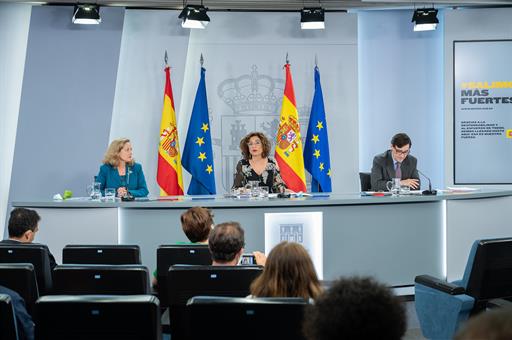Council of Ministers
Government releases first tranche of new ICO guarantees, amounting to 40 billion euros for investment by self-employed and companies
Council of Ministers - 2020.7.28
Moncloa Palace, Madrid
The Third Vice-President of the Government and Minister for Economic Affairs and Digital Transformation, Nadia Calviño, explained that the new line of guarantees joins a series of other measures already adopted since the start of the pandemic to support the liquidity and solvency of Spanish companies, which include public guarantees channelled through the Official Credit Institute (Spanish acronym: ICO).
The extraordinary Council of Ministers held on 3 July approved the Royal Decree-Law on urgent measures to support economic revival and employment, including the creation of a new line of ICO guarantees worth 40 billion euros. Today's agreement contains the details of the first tranche from this line, totalling eight billion euros.
Nadia Calviño explained that five billion euros will be allocated to guaranteeing the liquidity of working capital for SMEs and the self-employed - i.e. the payment of rent, supplies and wages - and to foster productive investment in areas where added value is generated, especially in the key areas of environmental sustainability and digitalisation. The remaining three billion euros will be targeted at other companies. The State guarantee covers 80% of new loans for the self-employed and SMEs and 70% of loans requested by other companies.
The previous ICO line, approved on 17 March with a provision of 100 billion euros, covered the liquidity and working capital needs of the productive fabric and now also fosters investment by the self-employed and companies.
Nadia Calviño stressed that a total of 140 billion euros will be mobilised for these guarantees. Furthermore, a series of public-private partnerships could mobilise 200 billion euros for liquidity and investment in order to alleviate the structural damage caused to the productive fabric by the coronavirus, encourage the economic recovery and job creation, and provide specific support to the hardest hit sectors.
The Third Vice-President of the Government went on to say that a total of 741,000 operations drawn against the line of guarantees for the self-employed and companies have been approved at 26 July, enabling more than 92 billion euros to be channelled towards financing the productive fabric.
Nadia Calviño argued that this liquidity support programme through the ICO [Official Credit Institute] has mobilised a larger volume of resources in terms of Gross Domestic Product than other peer countries. "It is an effort being made by all taxpayers as a whole, but its effectiveness is clear for underpinning the productive fabric, supporting family incomes and is a good basis for economic recovery in the second half of the year", she said.
Total impact from all these measures amounts to 20% of GDP
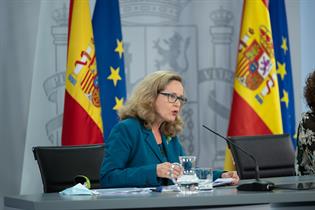 Pool Moncloa/Borja Puig de la BellacasaThe Minister for Economic Affairs explained that the Government of Spain has closely monitored developments in the pandemic and its response to the health emergency so as to offer the most suitable economic and social measures.
Pool Moncloa/Borja Puig de la BellacasaThe Minister for Economic Affairs explained that the Government of Spain has closely monitored developments in the pandemic and its response to the health emergency so as to offer the most suitable economic and social measures.
In this regard, Nadia Calviño stressed that the Government of Spain launched an action plan during the first stage of the pandemic - or resistance phase - to support the productive fabric and protect household incomes and families, thereby attempting to minimise the negative impact from the pandemic itself, the fall in demand and reduced economic activity in general. She said that these initiatives included greater flexibility for Temporary Lay-off Plans (Spanish acronym: ERTE), the ICO guarantees, the extraordinary benefits for the self-employed and measures to support the most vulnerable groups in society. "This plan prevented a disruptive scenario that could have led to a Spanish GDP dip of potentially more than 25% for 2020 as a whole, jeopardising more than three million additional jobs", she said.
In terms of the Temporary Lay-off Plans, the Third Vice-President of the Government stressed these arrangements were organised through social dialogue and "have enabled protection under exceptional conditions for up to 3.4 million people and over 550,000 companies". She added that more than 64% of workers - some 2,200,000 - who were subject to such a plan at the end of April have already returned to work.
During a second phase of its efforts, the Government of Spain promoted a business revival, reopening and employment plan to lay the foundations for "robust growth over the next year". The Spanish minister explained that the instruments provided during the previous phase were extended and specific plans were adopted for the sectors hardest hit by the crisis, such as tourism, the automotive industry, science and culture.
Nadia Calviño stressed that the overall impact from the measures adopted in these two phases amounts to 20% of forecast GDP in 2020.
She then announced that a third phase - to be announced in the autumn - will implement a recovery and resilience plan aimed at not only fostering short-term economic growth but also supporting an economic transformation and modernisation process based on the recently approved European funds that will encourage "more inclusive and sustainable" long-term growth.
Labour Force Survey
Nadia Calviño said that the Labour Force Survey data corresponding to the second quarter of the year "are perfectly consistent with the economic forecasts made under these absolutely extraordinary circumstances".
The data show that the number of people in work fell by more than one million when compared with the previous quarter and unemployment rose by 55,000 people. "The difference between the falling number of people in work and the relatively limited increase in the unemployment rate can be explained by a steep rise in the inactive population owing to the difficulty in actively seeking employment due to the extraordinary situation stemming from the pandemic", she said.
The Minister for Economic Affairs underlined three things in the Labour Force Survey: the growth of working from home; the role of Temporary Lay-off Plans; and the role of the benefit for cessation of business activity or significant fall in revenue paid out to the self-employed. "It reflects a very limited drop in self-employed work and even an increase in the number of sole traders when compared with the previous quarter", she said.
Economic forecasts
Nadia Calviño added that the government forecasts contained in the Stability Programme sent to Brussels in April show a steep decline in activity for the short term followed by an asymmetrical V-shaped recovery.
She believes that the profile and speed of the recovery will depend on a series of factors, the most significant of which is the evolution of the pandemic itself not only in Spain but around the world, responses in terms of healthcare and economic policy, and the impact by the epidemic on various sectors.
COVID-19 situation in Spain under control
The Government Spokesperson stressed that the Government of Spain and the regional government authorities are constantly coordinating their serious efforts on preventing, controlling and containing the COVID-19 pandemic. "We want to send out a clear message of confidence in our country as a safe destination that has prepared and strengthened itself to deal with the virus", she said.
In turn, the Minister for Health, Salvador Illa, agreed by saying that the pandemic in Spain is "under control" as it is in other European countries in its peer group, unlike America, where the highest number of cases is being recorded according to data from the World Health Organization.
Sufficient control mechanisms
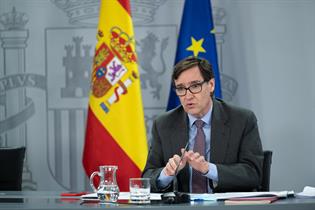 Pool Moncloa/Borja Puig de la BellacasaThe Minister for Health stressed that Spain has "sufficient" instruments with which to keep the pandemic under control, in particular its Royal Decree-Law 21/2020 (referred to as the Law on "the New Normal") and its Early Response Plan agreed between the Government of Spain and the regional governments at the Inter-regional National Health System Council.
Pool Moncloa/Borja Puig de la BellacasaThe Minister for Health stressed that Spain has "sufficient" instruments with which to keep the pandemic under control, in particular its Royal Decree-Law 21/2020 (referred to as the Law on "the New Normal") and its Early Response Plan agreed between the Government of Spain and the regional governments at the Inter-regional National Health System Council.
Salvador Illa believes that the regional governments, which have a "crucial and fundamental" role to play at this stage, are adopting "suitable and correct" measures, especially in terms of the early detection of cases and outbreaks, their isolation and monitoring, and limitations on meetings between family members, friends and nocturnal leisure activities, which are proving to be the source of many new cases. Furthermore, he welcomed their efforts on screening and actively searching for new cases, with up to 45,000 PCR tests per day enabling approximately 60% of asymptomatic cases to be identified.
There are currently 361 active outbreaks in Spain, although 70% of them involve less than 10 individual cases. 64% of new cases are concentrated in Catalonia and Aragon, but Salvador Illa stressed that the pressure on hospitals is low even in these hardest hit areas, enabling "regular and planned care and treatments to be maintained". The number of deaths in the last week throughout Spain as a whole stands at 6 or 7 people.
Call for individual responsibility
Salvador Illa insisted that, for all the measures in place to be truly effective, the public should continue to follow all the recommendations issued by the health authorities of their regional governments and continue to wear face masks, wash their hands often and maintain social distancing, referred to as the "Three Ms" in Spanish [mascarilla, manos y metros].
In this regard, the Government Spokesperson called for "invaluable" individual responsibility in following the rules to avoid the regrettable loss of human life and greater economic and social harm.
Potential vaccine in 2021
The Spanish minister said that we need to live with this virus "without fear but with respect" until we have an effective treatment or vaccine, and "cautiously" announced the possibility of one or more vaccines becoming available in the first half of next year. This hope can be gleaned from a report held by both the Ministry of Health and the Ministry of Science and Innovation, whose respective teams are involved at a European level in monitoring the development of research and negotiations with various potential suppliers.
340.9 million euros for new edition of the REINDUS Programme
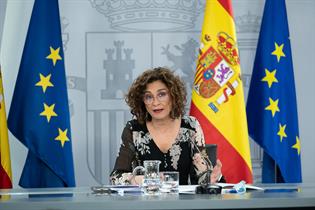 Pool Moncloa/Borja Puig de la BellacasaThe Government of Spain has approved a new edition of the Industrial Competitiveness Strengthening and Re-industrialisation Programme (REINDUS), which will be allocated 340.9 million euros in 2020.
Pool Moncloa/Borja Puig de la BellacasaThe Government of Spain has approved a new edition of the Industrial Competitiveness Strengthening and Re-industrialisation Programme (REINDUS), which will be allocated 340.9 million euros in 2020.
María Jesús Montero explained that the goal continues to be aimed at supporting the productive fabric, but even more so now that it has been heavily affected by the COVID-19 pandemic. This financial aid is aimed at all companies regardless of size and comes with better financing conditions based on more favourable interest rates.
Recipient companies will be able to take out a loan of up to 800,000 euros to improve and modify their production lines, purchase equipment, reduce greenhouse gas emissions and install 'Connected Industry 4.0' technologies.
30 million for fishing activity affected by COVID-19
The Council of Ministers has approved a Royal Decree to allocate 30 million euros in financial aid to ship-owners and fishermen so they can cope with the temporary suspension of fishing activity as a result of COVID-19.
The Government Spokesperson estimated that between 6,000 and 9,000 ships and their crews will be able to apply for this financial support, thereby preventing job losses among both the self-employed and salaried employees.
Maria Jesús Montero stressed that backing for this sector is essential so that Spain can maintain its leading position in terms of fishing production in the European Union, with revenue in this sector amounting to over 6.7 billion euros.
Humanitarian aid programme
The Government of Spain has authorised the Spanish Agricultural Guarantee Fund (Spanish acronym: FEGA) to contract food supplies under the 2021 Programme of Food Aid for the most Underprivileged, amounting to a total of 57 million euros.
María Jesús Montero stressed that the crisis caused by the COVID-19 pandemic has increased vulnerability among the most underprivileged in society, raising the significance of the programme this year.
The items to be purchased are those that make up a basic food basket, such as rice, pasta and preserves. They will be distributed to over 1,500,000 people via social organisations.
Other agreements
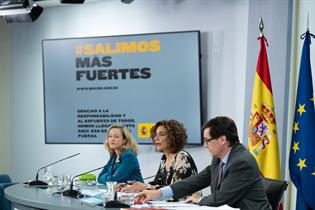 Pool Moncloa/Borja Puig de la BellacasaThe Council of Ministers approved a contribution of 42 million euros to the State Public Employment Service for development of the Integrated Employment Plan in the Canary Islands. María Jesús Montero stressed that the Ministry of Employment has made a significant effort to shorten deadlines and bring forward the planned periods for implementation of the programme so that it can take place in July rather than the second half of the year.
Pool Moncloa/Borja Puig de la BellacasaThe Council of Ministers approved a contribution of 42 million euros to the State Public Employment Service for development of the Integrated Employment Plan in the Canary Islands. María Jesús Montero stressed that the Ministry of Employment has made a significant effort to shorten deadlines and bring forward the planned periods for implementation of the programme so that it can take place in July rather than the second half of the year.
The Government of Spain has agreed to resume the SARA Programme, which enables collaboration between the Ministry of Equality and institutions such as Red Cross or the Secretariado Gitano Foundation to promote projects that help women find jobs and enter society. The Government Spokesperson believes that this measure is a "fundamental personal and social empowerment tool for improving their position".
Furthermore, the Government of Spain approved the creation of a commemorative medal for 'Operation Balmis' to recognise the work by the armed forces and civilian personnel attached to the Ministry of Defence who have made an active and important contribution to the fight against COVID-19.
María Jesús Montero said that 'Operation Balmis' was launched following declaration of the state of emergency on 14 March and close on 190,000 men and women were involved, offering their talent and skills to society at large in order to protect public health and safety.
Pedro Sánchez in the Lower House of Parliament and announcement of a Conference of Regional Presidents
At his own request, the President of the Government, Pedro Sánchez, will speak in the Lower House of Parliament tomorrow to explain the content and scope of the agreement reached at the extraordinary European Council last week and has announced a meeting with the presidents of the regional governments of Spain on Friday in San Millán de la Cogolla (La Rioja) for the same purpose and to assess the latest developments in the pandemic.
María Jesús Montero announced the Government of Spain's intention to call a Conference of Regional Presidents once a month. Since the state of emergency was declared on 14 March due to COVID-19, this highest-level political body for multilateral cooperation between the State and the autonomous regions and cities of Spain has met on 14 occasions by videoconference. The meeting on Friday will be the first face-to-face meeting since 2017.
Non official translation





